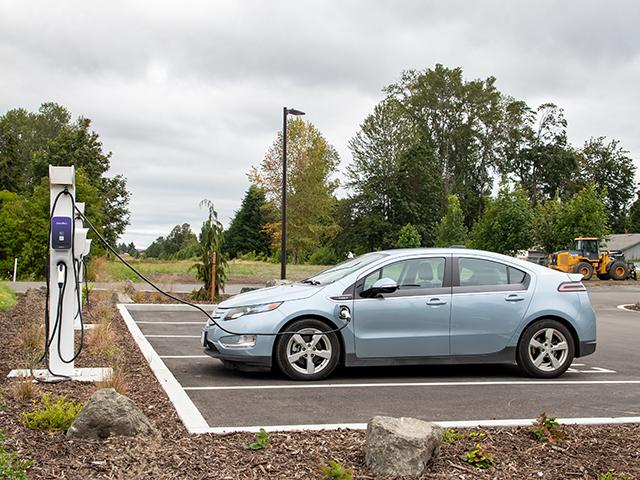Court Favors EPA, California on EV Mandate
California EV Mandate Moves Forward Following Federal Court Decision
LINCOLN, Neb. (DTN) -- California will be allowed to continue implementing standards mandating the sale of so-called zero-emissions vehicles after a federal appeals court on Tuesday sided with the U.S. Environmental Protection Agency in a lawsuit filed by 17 states and many agriculture interest groups challenging a Clean Air Act waiver.
The U.S. Court of Appeals for the District of Columbia Circuit issued a 48-page order Tuesday rejecting legal arguments made by attorneys general in 17 states, who said EPA's granting of a waiver in March 2022 to allow California to set what essentially is an electric vehicle mandate violates the Constitution.
The states had argued it violated their sovereign rights to set their own standards or no standards at all.
"State petitioners, meanwhile, argue that, to the extent that there is any doubt that they have met their burden of demonstrating causation and redressability, this court should resolve it in their favor given the 'special solicitude' to which states are entitled when they seek to protect their 'quasi-sovereign interests,'" the court said in its opinion.
"We disagree. The 'special solicitude' afforded to states can relax standing requirements only so far. Even the 'greater leeway' afforded to states seeking to protect quasi-sovereign interests cannot save defective standing claims when, as here, the record is 'almost completely silent' with respect to an element of a state's standing."
In 2022, California regulators announced a plan to ban the sale of gasoline-powered vehicles in the state by 2035, setting the stage for moving to all-electric vehicles.
Replacing gasoline vehicles with EVs is seen as a direct threat to fuel companies including ethanol producers.
The states alleged three financial injuries caused by EPA's waiver, including that it causes automobile manufacturers to increase the cost of conventional vehicles across the country; how the shift to more EVs would cause the states to generate less fuel-tax revenue; and that an increase in EVs from the waiver would affect the states' electrical grids.
P[L1] D[0x0] M[300x250] OOP[F] ADUNIT[] T[]
The court denied the states' financial injury claims, concluding there was no way any court action could redress the claims.
The legal challenge was filed by attorneys general in Ohio, Alabama, Arkansas, Georgia, Indiana, Kentucky, Kansas, Louisiana, Mississippi, Montana, Missouri, Nebraska, Oklahoma, Texas, South Carolina, Utah and West Virginia.
The appeals court also ruled the agriculture and fuel groups joining the lawsuit did not have standing to raise their claims. Those groups include Diamond Alternative Energy LLC, Iowa Soybean Association, Minnesota Soybean Growers Association, South Dakota Soybean Association, American Fuel and Petrochemical Manufacturers, Domestic Energy Producers Alliance, Energy Marketers of America: National Association of Convenience Stores, Clean Fuels Development Coalition, ICM Inc., Illinois Corn Growers Association, Kansas Corn Growers Association, Michigan Corn Growers Association, Missouri Corn Growers Association and Valero Renewable Fuels Company LLC.
On the states' question of constitutionality, the appeals court ruled the claims had no merit.
"To assess state petitioners' standing for this constitutional claim, we again 'assume that on the merits' petitioners 'would be successful,'" the court said.
"Assuming state petitioners' constitutional theory is correct, Section 209(b) and the EPA's 2022 decision violate their constitutionally protected interest in equal sovereignty by leaving them with less regulatory authority over vehicle emissions than California."
The states argued that invalidating the 2022 EPA decision would "redress that injury" and "restore their sovereign equality" by removing California's "greater" authority.
"The nature and extent of equality between the states has been a central debate throughout our country's history, from the founding to the admission of new states and beyond," the court said.
"But state petitioners point us to no meaningful support for their novel request to apply the equal sovereignty principle as a categorical limit on Congress's power to regulate interstate commerce."
On March 9, 2022, EPA Administrator Michael Regan announced the agency rescinded the Trump administration's actions to deny the waiver to California.
On Oct. 20, 2022, the 17 states said in a court brief that EPA's and California's actions already were leading other states to adopt similar mandates.
So far, 17 states and the District of Columbia have adopted California's standards.
California first sought a waiver from EPA in 2005, to allow the state to establish its own emissions standards for greenhouse gases. The agency denied the waiver request in 2008.
With a change in presidential administrations, EPA granted California a waiver in 2013.
Read more on DTN:
"Ag, States Challenge EPA Action on EVs," https://www.dtnpf.com/…
Todd Neeley can be reached at todd.neeley@dtn.com
Follow him on social media platform X @DTNeeley
(c) Copyright 2024 DTN, LLC. All rights reserved.




